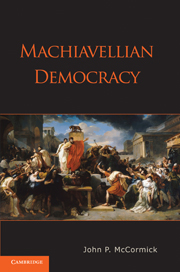Book contents
1 - Peoples, Patricians, and the Prince
Published online by Cambridge University Press: 05 June 2012
Summary
A new prince has never disarmed but rather always armed his subjects.…for in arming them they all become his partisans.
Machiavelli, The Prince, chap. 20All the laws made in favor of freedom arise from the disunion between the popolo and the grandi.
Machiavelli, Discourses I.4Machiavelli might seem a rather dubious figure from whom democrats can learn anything worthwhile about control of elites and government by the people. After all, the Florentine is notorious for advising rulers to manipulate their subjects. Indeed, many interpreters consider this to be the main point of his most famous work, The Prince. In the present chapter, and throughout this book, I focus primarily on Machiavelli's Discourses, a work largely devoted to republics and the place of popular participation and elite accountability within them. Nevertheless, it is worth noting at the outset the surprising pro-popular and anti-elitist elements evident within the former, shorter, and more infamous work explicitly devoted to principalities. I will then offer some general considerations on the respective roles of the people and the elite in Machiavelli's ideal polity, the Roman Republic.
The Prince and the People
Many readers who approach The Prince with justifiable skepticism often seize upon the apparent cynicism of the following observation and piece of advice: since the common people, “the vulgar,” are captivated by “appearances,” Machiavelli recommends that a prudent prince endeavor to exploit this disposition to his advantage (P 18).
- Type
- Chapter
- Information
- Machiavellian Democracy , pp. 21 - 35Publisher: Cambridge University PressPrint publication year: 2011

